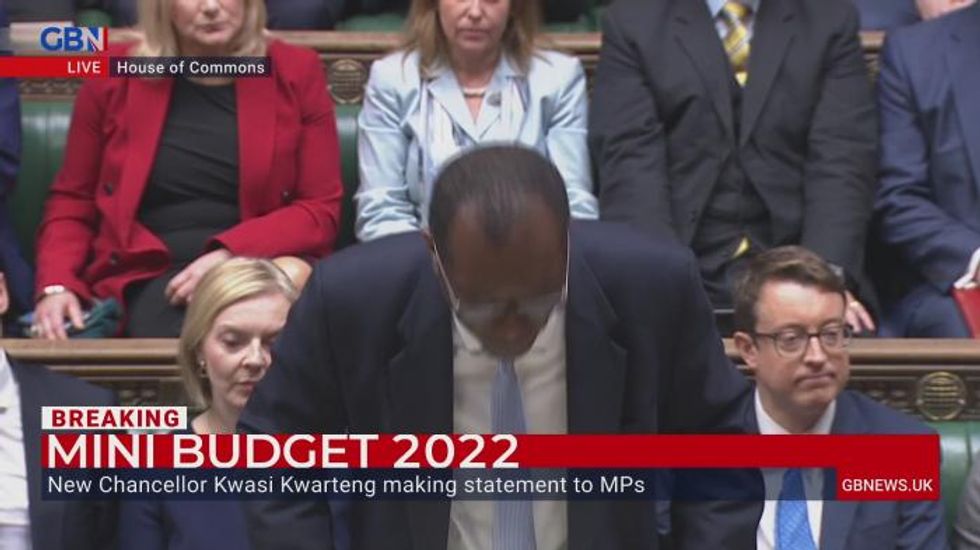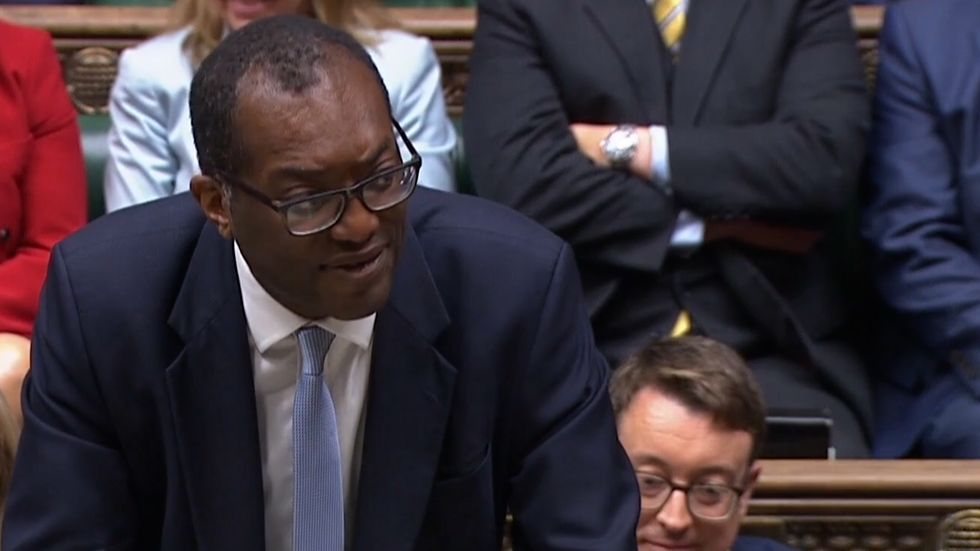Don't Miss
Most Read
Trending on GB News
The pound sank to a 37-year low as Chancellor Kwasi Kwarteng unveiled tens of billions of pounds of tax cuts and spending.
Equity markets were also particularly downbeat, with the FTSE 100 plunging to its lowest in two months.
Sterling declined by as much as 0.89% to 1.115 US dollars as the Chancellor spoke to Parliament at 9.30am on Friday.
It has since stabilised at around 1.119 dollars, but this remains below the previous 37-year low struck earlier this week after concerns over surging interest rates hit the currency.
It comes after the Bank of England launched another 0.5 percentage point interest rate hike to 2.25% on Thursday and warned the UK could already be in a recession.
Chancellor Kwasi Kwarteng abolished the top rate of income tax for the highest earners as he spent tens of billions of pounds in a “gamble” to drive up growth during a cost-of-living crisis.
Parliament TV
The central bank previously projected the economy would grow in the current financial quarter but said it now believes Gross Domestic Product (GDP) will fall by 0.1%, meaning the economy would have seen two consecutive quarters of decline – the technical definition of a recession.
Economists had warned that the Chancellor’s tax-cutting ambitions could put further pressure on the pound, which has also been impacted by strength in the US dollar.
Former Bank of England policy maker Martin Weale cautioned that the new Government’s economic plans will “end in tears” – with a run on the pound in an event similar to what was recorded in 1976.
Economists at ING also warned on Friday that the pound could fall further to 1.10 against the dollar amid difficulties in the gilt market.
Chancellor Kwasi Kwarteng abolished the top rate of income tax for the highest earners as he spent tens of billions of pounds in a “gamble” to drive up growth during a cost-of-living crisis.
In a so-called mini-budget axing the cap on bankers’ bonuses and adding restrictions to the welfare system, he argued that tax cuts are “central to solving the riddle of growth”.
Treasury estimates put the raft of cuts, including Liz Truss’s promises to reverse the national insurance rise and axe the hike to corporation tax, as costing nearly £45 billion a year in 2026.
Sterling declined by as much as 0.89% to 1.115 US dollars as the Chancellor spoke to Parliament at 9.30am on Friday.
Dominic Lipinski
From April, the 629,000 earners getting more than £150,000 a year will no longer pay the top income tax rate of 45% and will instead pay the 40% applicable to those on over £50,271.
And he brought forward the planned cut to the basic rate of income tax to 19p in the pound a year early to April.
Mr Kwarteng also revealed his estimate that the two-year energy bills bailout will cost around £60 billion over the first six months from October.
The major spending package also included:
– A cut to stamp duty, meaning 200,000 less people will pay the tax on house purchases.
– The introduce of VAT-free shopping for overseas visitors.
– Legislation to force trade unions to put pay offers to a member vote so strikes can only be called once negotiations have fully broken down.
– Confirmation of plans to make around 120,000 more people on Universal Credit take active steps to seek more and better paid work, or face having their benefits reduced.













